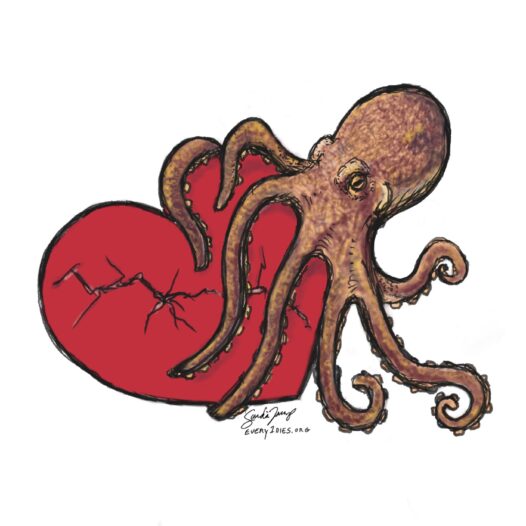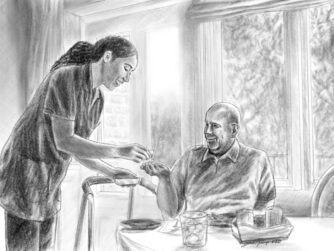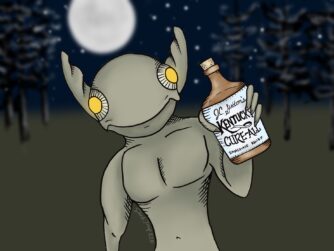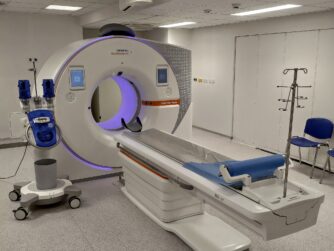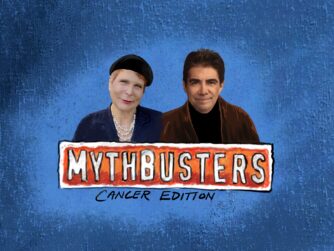Takotsubo cardiomyopathy – also called broken heart syndrome – can cause heart-attack like symptoms, most commonly after severe emotional or physical stress.
Can a broken heart be mended? Perhaps if we are talking about takotsubo cardiomyopathy – also called broken heart syndrome – which is stress-induced damage to the heart muscle. Ninety percent of the people with this heart syndrome are post-menopausal women whose symptoms occur after severe emotional or physical stress. Learn about it in this episode.
In this Episode:
- 03:04 – Obituaries My My Mother Wrote for Me When I was In My 20’s
- 07:21 – Feeding a Broken Heart: Chicken Tetrazzini
- 09:15 – Takotsubo Cardiomyopathy (TTS): You Really Can Die from a Broken Heart
- 24:22 – Epitaph by Merrit Maloy
- 25:41 – Outro
Understanding Takotsubo Syndrome (TTS)
Takotsubo cardiomyopathy, or takotsubo syndrome, is a heart event that happens when part of the heart muscle suddenly becomes weakened and unable to contract correctly, causing symptoms like a heart attack.
During a takotsubo event, the heart’s largest chamber (the left ventricle) swells and changes shape. This stops the heart pumping properly and reduces blood flow out of the heart. Symptoms can include chest pain, difficulty breathing, dizziness, and weakness. If you have any of these symptoms, please consider this an emergency and get help.
Why is it called “Takotsubo”?
The condition gets its name from the Japanese term ‘tako-tsubo’ – a traditional octopus pot (trap) that looks similar to the left ventricle during a takotsubo event (see diagram below).

The Role of Catecholamines and Estrogen
The exact cause of TTS is still unknown, but stressful events appear to trigger TTS. Researchers proposed a release of too many catecholamines is a possible mechanism. Catecholamines (ka·tuh·kow·luh·meen) are neurotransmitters and hormones produced in response to stress. They include dopamine, epinephrine (adrenaline), and norepinephrine (noradrenalin).
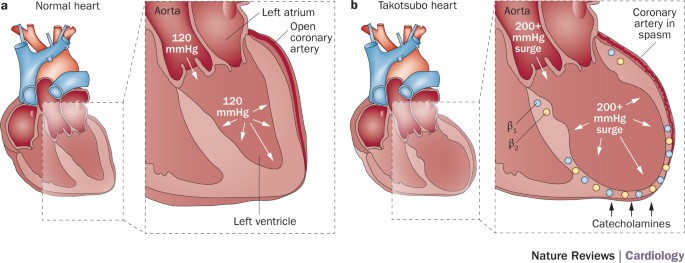
Estrogen is also believed to play a role. 80-90% of TTS patients are women. Estrogen helps regulate the body’s stress response and blood flow in small vessels. Loss of estrogen after menopause may be a factor, as ninety percent of patients diagnosed with takotsubo cardiomyopathy are postmenopausal women age 60 to 80.
Managing Stress
Because stress appears to be a trigger for Takotsubo cardiomyopathy, it is important to learn healthy coping strategies to manage stress. See our related content where we talk about meditation, exercise, crafting, and other outlets.
Related Content:
- S4E18: How to Exorcise Depression and Anxiety with Exercise
- S3E37: What Can a Mindfulness Practice Offer You?
- The Tao of Ironing
- S1E23: Support Groups
- S2E16: Big Girls Do Cry
- S3E22: Why Do We Fear Death?
- S1E07: No Mud, No Lotus – What is the New Normal?
Feeding a Broken Heart
A Pinch of Yum has a series of recipes called Feeding a Broken Heart. This one is Chicken Tetrazzini: egg noodles, sautéed mushrooms, roast chicken all baked together with a béchamel sauce. Head over to A Pinch of Yum for a complete backstory and recipe.

Epitaph
Charlie read this timeless poem by Merrit Malloy. It was featured in an NCIS episode when Director Vance reads a poem aloud to the team while mourning the death of Fornell’s daughter. You can watch the scene below.
References:
- Takotsubo cardiomyopathy: The tale of a broken heart American Nurse
- Takotsubo cardiomyopathy: Healing a broken heart American Nurse
- (17) (PDF) Four Cases of Takotsubo Cardiomyopathy Linked with Exacerbations of Psychiatric Illness (researchgate.net)
- What is Takotsubo (broken heart syndrome)? Heart Foundation NZ
- Sethi, Y., Murli, H., Kaiwan, O., Vora, V., Agarwal, P., Chopra, H., Padda, I., Kanithi, M., Popoviciu, M. S., & Cavalu, S. (2022). Broken Heart Syndrome: Evolving Molecular Mechanisms and Principles of Management. Journal of clinical medicine, 12(1), 125. https://doi.org/10.3390/jcm12010125
- Singh, T., Khan, H., Gamble, D. T., Scally, C., Newby, D. E., & Dawson, D. (2022). Takotsubo Syndrome: Pathophysiology, Emerging Concepts, and Clinical Implications. Circulation, 145(13), 1002–1019. https://doi.org/10.1161/circulationaha.121.055854
- Obituaries My Mother Wrote for Me While I Was Living in San Francisco in My Twenties | The New Yorker
Resources:
- What is Takotsubo (broken heart syndrome)? Heart Foundation NZ
- International Takotsubo Facebook Support Group
- Is Broken Heart Syndrome Real? Americaqn Heart Association
- How Blood Flows Through the Heart & Body (clevelandclinic.org)
- How the Heart Works – Heart Foundation NZ
- Epitaph (youtube.com)
- Epidemiology and pathophysiology of Takotsubo syndrome (Nature Reviews Cardiology)

https://blog.feedspot.com/palliative_care_podcasts/


